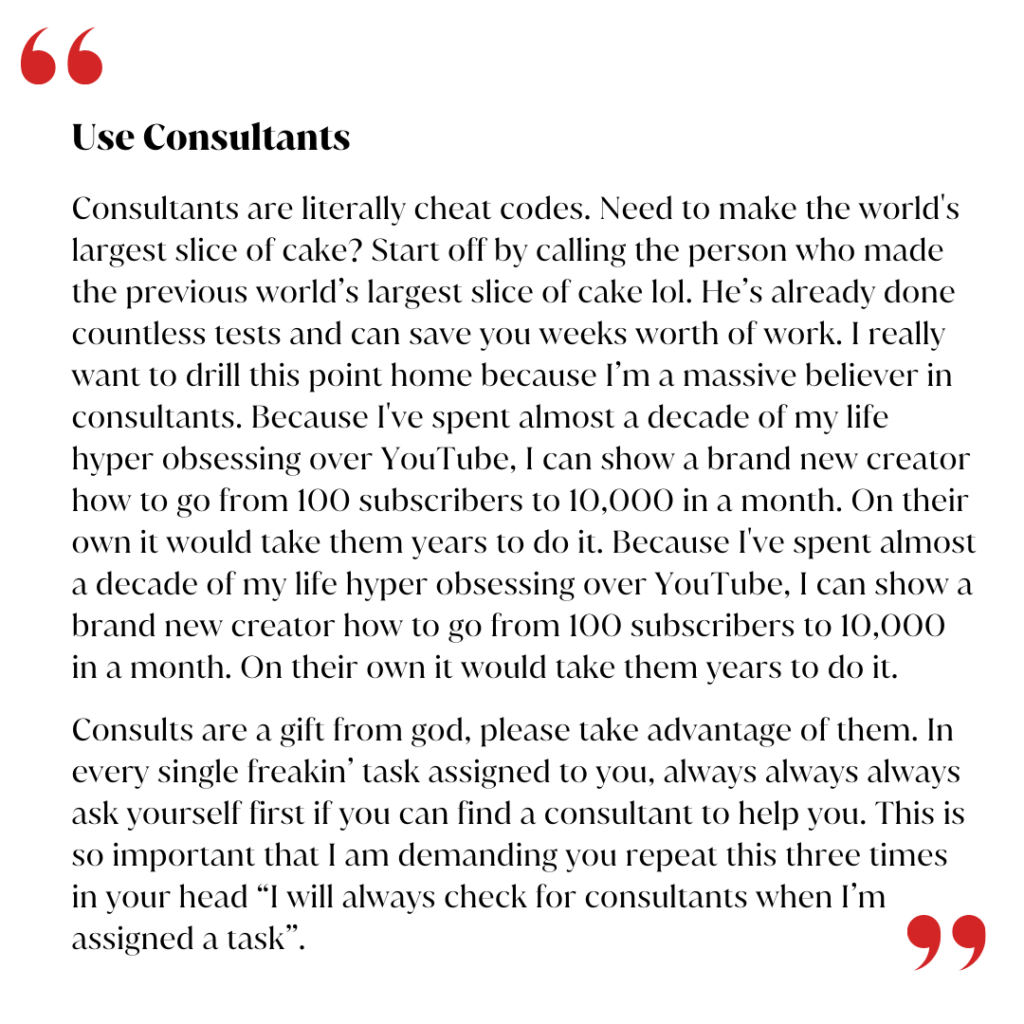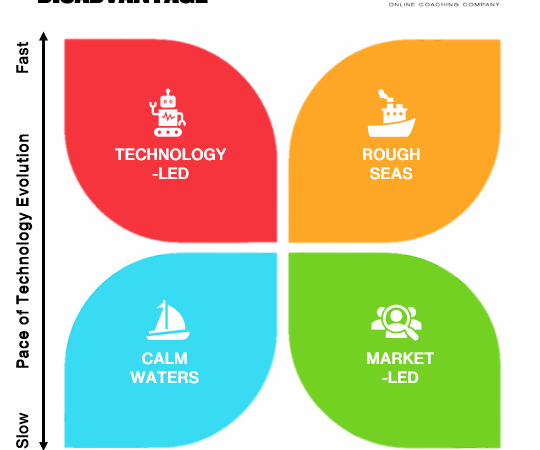DATELINE: BRISBANE, AUSTRALIA
“Consultants are a Gift from God” – Mr Beast
Ask yourself – If you wrote a deep, blunt, and politically incorrect playbook like this for your business, what would it say?
I wrote you two weeks ago about the 3 core principles of Founder Mode:
- Set the Context
- Manage the Energy
- Coach, don’t Play
This week I’ve been reading a dynamic example, the leaked Playbook written by Jimmy “Mr Beast” Donaldson. (If you don’t know the story of Mr Beast, this 50min documentary is excellent – I don’t watch his videos, but I love his passion for business.)
Donaldson’s billion dollar business empire is under threat right now – in a text book example of when Founder Mode doesn’t help, he is accused of using his resources to protect his best friend who is credibly accused of some nasty stuff.

I’m not knowledgeable enough to have an opinion on that …
…I am knowledgeable enough to know that the people criticising the Mr Beast culture displayed in this document are completely wrong.
Extreme Responsibility, High Expectations
This playbook is direct. Donaldson pulls no punches about what he expects from his team – “Own your mistakes”, “work with intensity”, “that’s on YOU not the contractor”, “I’d rather you be honest with each other than nice to each other”. Shirking your business responsibilities is “literally the equivalent of saying I suck at what I do”. A-Players are “obsessive” … C-Players “are poisonous and should be transitioned to a different company IMMEDIATELY.”
Does that sound like a bad Culture to you? Guess what, he doesn’t care.
Now, this isn’t my business’s culture. And it’s not the right culture for everyone. But Mr Beast has the highest YouTube subscriber count, and it’s not even close – if you want to win the Premier League you can’t run the team like a pub football comp.
Do you as a founder have high expectations of your team? Then it’s 100% on you to set the context, manage the energy, and coach your team to that success.
If others disagree? They should be transitioned to a different company IMMEDIATELY.
Bonus: I am God’s Gift to your Business

Now, as a business coach, consultant, and trainer am I biased drawing your attention to the critical value consultants have brought Mr Beast’s empire? Yes. That doesn’t make it wrong.
My evidence isn’t just the work I’ve done in 400 companies, it’s the work teams of consultants have done in my business, Como. My family’s success (defined as freedom through business) is a reflection of the coaches, consultants, marketing specialists, and other niche advisors we have invested money into over the past 20 years.
Saving money by trying to DIY everything is one of the most expensive things a business owner can do.
Let me stop you there. Read that line again. I’m sure you understand it, you are aware that good advisors are helpful. But do you truly acknowledge how much time and money your business has lost by not asking for help?
Maybe this week’s Blackboard Fridays episode will help…
Blackboard Fridays Episode #81 – Why You’re Perfect, and Don’t Need to Change
G’day, Blackboarders! A theme you’ve probably sensed in 80 episodes of Blackboard Fridays is that we’re talking a lot about change. Specifically, we’re trying to help you, the aspirational business owner, to work out which parts of your business aren’t working for you today and what exactly it is that you need to change in the simplest possible way in order to propel you towards your vision.

Today I’m going to talk about the missing step that stops a lot of people, (and ultimately every business is run by a person), from going through that change process.
The Three Layers of Learning
Now you might remember we talked about imposter syndrome. We looked at three layers of learning: inspiration, strategic design, and execution. Unless we get that inspiration, we don’t make a choice to do something different and unless we spend some time designing the change, we never fully execute. So it could be said that each of those is a missing step.
For some business owners, they’ll never get the inspiration. They don’t spend enough time on the strategy or they don’t actually bother to execute. For me though, there’s one step that sits above those, that’s often overlooked in a change management process.
It’s linked to the importance of feelings and emotion of business owners, particularly in the SME and private enterprise world. I’m going to use a really obvious example that I imagine most of us could connect to, quitting smoking. We, for the most part, all know somebody who has or at some time has wanted to quit smoking.
Now when we just look at these four steps, it should be really obvious to them that they need to quit smoking. I mean, how much more awareness does the person in today’s modern age need to know that smoking is bad for you? How much more awareness can we give them so that they understand that they need to make a different choice? And yet people don’t.
On a more personal level, I can use exercise as a great example. I’m well aware of the benefits of exercise and the fact that I need to exercise more. However, I’m yet to make a choice to actually join a gym, take up running, or go to a personal trainer. And it’s because of this missing step. And the missing step is acknowledgement. Me as an individual, the smoker as an individual, and you as an individual business owner, at some point in the change process need to acknowledge emotionally, on a personal level, that this change is necessary.
As long as I continue to think that I’m young and healthy and I have plenty of time to lose weight, I’m not going to acknowledge that that’s not the case and make a different choice. As long as the smoker thinks it’s going to be okay, they’ll be the exception to the rule, or they’ll quit at some point in the future, as long as they fail to connect emotionally and acknowledge that they need to make a change, they’re never going to.
The Awareness vs Acknowledgment Trap
If you as a business owner think that your sales process is satisfactory you’re not going to improve your conversion rates. If you think your growth plan is kind of okay, you’re not going to map out a capacity process that’s going to give you more dollars. If you think that the team you hire are always going to be lousy, you’re never going to implement a better recruitment process or a stronger culture. As business owners, there’s only so much we can do each day and so we listen to our emotions.
The challenge is, most people are trying to change you, trying to change me, trying to get that smoker to quit. They focus only on the awareness. They assume I’m not at the gym because I just don’t understand or that I’m not aware of the benefits. Likewise, they assume the reason you’re not investing in a growth plan is because you don’t know the benefits of it. Of course you do. You’re not an idiot. You’re running a successful business. You’ve got better things to do.
Until you understand how some of those things are holding your business back, until you emotionally engage with them and go we need to do something different or this business isn’t going to continue to be here, until you have that engagement, you’re not actually going to make a choice. At least not one with any seriousness.
Of course if you don’t make the choice then you’ll never design the strategy and you’ll never execute. With your team, don’t make this mistake. And with yourself, don’t make the mistake either. Listen to your feelings. Understand what they’re telling you. Acknowledge what is so. Then make a different choice, design, and execute. And change will happen for you.
With Love,
Jacob Aldridge
International Business Advisor
WhatsApp +61 427 151 181
Visit my website
Connect on LinkedIn




